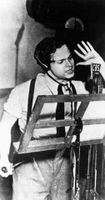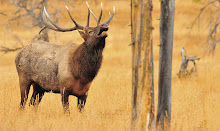 The Bulwer-Lytton Fiction Contest from San Jose State University annually honors the dark-and-stormy-night memory of Edward George Bulwer-Lytton, author of one of the more infamous leads in literary history. The 2005 winners are just now posted online according to categories (Adventure, History, Grand Panjandrum, etc.). Enjoy!
The Bulwer-Lytton Fiction Contest from San Jose State University annually honors the dark-and-stormy-night memory of Edward George Bulwer-Lytton, author of one of the more infamous leads in literary history. The 2005 winners are just now posted online according to categories (Adventure, History, Grand Panjandrum, etc.). Enjoy!
Friday, July 29, 2005
The Bulwer-Lytton Fiction Contest
 The Bulwer-Lytton Fiction Contest from San Jose State University annually honors the dark-and-stormy-night memory of Edward George Bulwer-Lytton, author of one of the more infamous leads in literary history. The 2005 winners are just now posted online according to categories (Adventure, History, Grand Panjandrum, etc.). Enjoy!
The Bulwer-Lytton Fiction Contest from San Jose State University annually honors the dark-and-stormy-night memory of Edward George Bulwer-Lytton, author of one of the more infamous leads in literary history. The 2005 winners are just now posted online according to categories (Adventure, History, Grand Panjandrum, etc.). Enjoy!
Monday, July 25, 2005
Grammar IQ Challenge Quiz
 Capital Community College of Hartford, Connecticut, sponsors a wonderful web site called Guide to Grammar and Writing which offers clear, accurate, easy-to-navigate help on grammar and writing rules. As the web site's "Caveat Lector" page says,
Capital Community College of Hartford, Connecticut, sponsors a wonderful web site called Guide to Grammar and Writing which offers clear, accurate, easy-to-navigate help on grammar and writing rules. As the web site's "Caveat Lector" page says,Try the web site's Grammar IQ Challenge Quiz to see how confident you are on some common grammar questions.
Tuesday, July 19, 2005
Glossary for Medieval Art and Architecture
Games for the Brain
 Games for the Brain makes it possible for you to "Play neverending quiz and memory games to train your thinking skills."
Games for the Brain makes it possible for you to "Play neverending quiz and memory games to train your thinking skills."
Monday, July 18, 2005
Golden Age Romance Comics
 The Archive of Golden Age Romance Comics is "a resource for scholars and fans interested in golden era romance comics, containing full scans of issues."
The Archive of Golden Age Romance Comics is "a resource for scholars and fans interested in golden era romance comics, containing full scans of issues."What? You say you've never heard of golden age romance comics before? Interestingly enough, the web site's essay on the genre explains that these comics represented the first and last time that adult American women were major consumers of comics:
Romance comics were one of five major genres of adult comics which boomed after World War II. The so-called golden-age of comics began in 1935 and ended at about the time of the self-imposed Comics Code of 1954. The main period of interest to this archive is the third phase of the golden era, from 1948 to 1954. During this period comic readership was at its height, and adults, both men and women, were a major piece of the market. These years saw comic sales approach 60 million issues per month, and a 1950 government-sponsored study of an Ohio town revealed that 54 percent of all comic readers were over 20-years old, and that the average reader bought about 11 comics per month.All you Westerners be sure to check out Rangeland Love, which features stories such as "The Trail of the Purple Sage" and "Redhead on the Range!"
The Complete Review

The web site also includes links to outside reviews (mostly from British periodicals) and a link to the CR's weblog The Literary Saloon. (No, that's not a typo for salon . . . it really is saloon!)
Friday, July 08, 2005
Their Circular Life :: Cool Site o' the Day
Their Circular Life provides a beautiful, thought-provoking glimpse into daily life--sights and sound as affected by the passage of time.
Thursday, July 07, 2005
"War of the Worlds": Behind the 1938 Radio Show Panic
 The Spielberg/Cruise War of the Worlds movie has enjoyed a good opening weekend, but its impact is nothing like what happened in 1938.
The Spielberg/Cruise War of the Worlds movie has enjoyed a good opening weekend, but its impact is nothing like what happened in 1938.According to National Geographic News's article "War of the Worlds": Behind the 1938 Radio Show Panic, thousands of people believed they were under attack by Martians:
It was the day before Halloween, October 30, 1938. Henry Brylawski was on his way to pick up his girlfriend at her Adams Morgan apartment in Washington, D.C.As he turned on his car radio, the 25-year-old law student heard some startling news. A huge meteorite had smashed into a New Jersey farm. New York was under attack by Martians.
"I knew it was a hoax," said Brylawski, now 92.
Others were not so sure. When he reached the apartment, Brylawski found his girlfriend's sister, who was living there, "quaking in her boots," as he puts it. "She thought the news was real," he said.
It was not. What radio listeners heard that night was an adaptation, by Orson Welles's Mercury Theater group, of a science fiction novel written 40 years earlier: The War of the Worlds, by H.G. Wells.
However, the radio play, narrated by Orson Welles, had been written and performed to sound like a real news broadcast about an invasion from Mars.
Reportedly, Welles had no idea that his broadcast would result in widespread panic: "According to the New York Times, Welles expressed profound regret that his dramatic efforts could cause consternation. "I don't think we will choose anything like this again," he said. He hesitated about presenting it, Welles said, because "it was our thought that perhaps people might be bored or annoyed at hearing a tale so improbable."
But in 1938, America was rattled by what it was already hearing on the radio and primed for more bad news, no matter how improbable. As The War of the Worlds Invasion: The Historical Perspective explains,
Americans were now able to connect with events and hear their law and opinion makers as never before. A notable trailblazer in this regard was President Franklin D. Roosevelt, whose "fireside chats" (beginning in 1933) brought the voice of government and authority into the home as never before. Major news events also gripped the nation. Bulletins on the hunt for the kidnapped baby son of aviator Charles Lindbergh kept listeners in an agony of suspense over several months in 1932 and in 1936 the war correspondent Hans Von Kaltenborn became the first American reporter to broadcast live from a war zone, when he brought the actual sounds of a Spanish civil war battle into ordinary homes. Equally dramatic was the fatal crash of the airship Hindenburg, recorded on May 6th 1937 by Herbert Morrison of Chicago station WLS, an event that reduced the helpless reporter to tears of frustration and horror. Undoubtedly however, it was the troubling broadcasts from Nazi Germany that did most to unsettle America in this period. During the Munich Crisis of September 12-30th 1938, more radios were sold to anxious Americans than in any previous three-week period, as Hitler rallied his forces and the world slid inexorably toward war.Orson Welles and his colleagues were preparing their broadcast for an unsuspecting nation which was already tense.
- Read the entire Nat'l Geographic News article
- Obtain the 1938 broadcast at the Mercury Theatre on the Air website
- Visit the 2005 movie's web site
- Read H. G. Wells's original novel, from Project Gutenberg
- Enjoy Darkhorse.com's eComic of the novel (in progress now)
Wednesday, July 06, 2005
Beach Bag of Books
- Bookreporter.com's Beach Bag of Books.
- Carnegie Library of Pittsburgh's Adult Summer Reading Book Lists.
- National Public Radio's Summer Reading 2005.
- The Guardian's Summer Reading.
- University of California at Berkeley's annual Summer Reading List.
Using WebAdvisor to Find Classes

This Friday, 08Jul05, Northwest College holds the second New Student Orientation session of the summer on the Powell campus. One of the features of the orientation session is the chance for students to register for classes, but how does a new student know what's available? Enter WebAdvisor.
Among other things, WebAdvisor allows students to check on the availability of classes. Let's say you've heard Dr. Rob Koelling is the person to take for freshman English. Here's how to find out if Dr. Koelling has an available class:
- Go to the Northwest College WebAdvisor site at www2.nwc.cc.wy.us/datatel/openweb/index.html.
- Choose Search for Classes.
- On the next page, fill out three fields: Term (05/FA -Fall 2005), Subjects (ENGL), and Instructor's Last Name (Koelling).
- Click on the Submit button at the bottom.
- The results page shows--sadly--that Dr. Rob Koelling's freshman classes are all full.
The final summer registration session is Thursday-Friday, 04Aug05 to 05Aug05, with walk-in registration on Friday,26Aug05.
"I cannot live without books" --Thomas Jefferson
Short Short Stories by Dave Eggers
 Brent and Karen - I hope you get this message soon. I know you're enjoying your dinner and I'm supposed to be babysitting Milo, and the last thing I'd want to do is to dim the glow of your rare night out. But I feel like I have to make note of a few things, while they're happening. At the moment, I'm sitting on the couch, and your toddler has one foot on my stomach and the other on my left clavicle; he's apparently trying to get at the fish tank above me. Is it painful? Let's put aside my pain for a moment. . . .
Brent and Karen - I hope you get this message soon. I know you're enjoying your dinner and I'm supposed to be babysitting Milo, and the last thing I'd want to do is to dim the glow of your rare night out. But I feel like I have to make note of a few things, while they're happening. At the moment, I'm sitting on the couch, and your toddler has one foot on my stomach and the other on my left clavicle; he's apparently trying to get at the fish tank above me. Is it painful? Let's put aside my pain for a moment. . . .Eggers explains that his inspiration for bite-sized stories came from writer Lydia Davis:
So about two years ago I started jotting down notes for short short stories, most of them taking their cue from some small moment that I watched or thought about - usually something that wouldn't or couldn't find its way into a novel, and which didn't warrant a longer story. The results are very different from Davis's - hers are brilliant acts of philosophical origami, while mine are little moments in the lives of abnormal people.
The Omnificent English Dictionary In Limerick Form
The OEDILF is now working on all words beginning with aa- through ba-. Current status? 5,458 approved limericks with about 10,000 pending. Check out recently approved limericks here.
Here's an example of what a limerick definition looks like:
Allhallowmas, Allhallowmass, All-Hallow, All-Hallows, All Saints' Day, Hallowmas by mike scholtes
Allhallowmas was the routine
For honoring saints and their scene,
Though the meaning in time
Has become less sublime:
It's the day that's apres Halloween.
(all-HAL-o-mass) Allhallowmas was instituted by Pope Boniface IV (608-–615) in 609 CE (or as he would have put it, Anno Domini), and the date was set to November 1 by Pope Gregory IV (827-–844). In today's Roman Catholic Church it is called All Saints' Day. Allhallowmass is an obsolete spelling, and other synonyms are All-Hallow, All-Hallows, and Hallowmas.
Handbook for the Appreciation of Japanese Traditional Crafts
 The online Handbook for the Appreciation of Japanese Traditional Crafts is a fascinating explanation of seven Japanese craft areas. (At left, an example of Urushi.)
The online Handbook for the Appreciation of Japanese Traditional Crafts is a fascinating explanation of seven Japanese craft areas. (At left, an example of Urushi.)According to the website--sponsored by the Japan Crafts Association (Nihon Kogeikai)--traditional Japanese crafts almost became extinct following World War II. In 1950, the Law for the Protection of Cultural Properties helped preserve Japanese crafts and the spiritual values those crafts embody.
The online exhibit provides an online complement to a wonderful resource in Northwest College's Hinckley Library: The Traditional Crafts of Japan (VIDEO 745.0952 T763T, eight VCR tapes). Together, the online exhibit and the videos provide insight into traditional Japanese life styles.
The Edwardians: Secrets and Desires
The exhibit's Essay provides interesting context on this era which should be useful to any student of art or literature.
Leaves of Gold
 Leaves of Gold: Treasures of Manuscript Illlumination is an online exhibit about manuscript illumination from the Philadelphia Museum of Art and the Philadelphia Area Consortium of Special Collections Libraries.
Leaves of Gold: Treasures of Manuscript Illlumination is an online exhibit about manuscript illumination from the Philadelphia Museum of Art and the Philadelphia Area Consortium of Special Collections Libraries.At the online Learning Center, a person can view a slideshow to learn about the kinds of medieval manuscripts, design an illumination, and make a manuscript online.
Pictured is the Wheel of Fortune from Roman de la Rose by Guillaume de Lorris and Jean de Meun, with revisions by Gui de Mori France, Paris, c. 1440–80, the Workshop of Maître François.
Book Fairs and Other Literary Events
Cultural Literacy Dept. (Pop Division)
 The American Film Institute (AFI)has ranked the top 100 American movie quotations since 1927 up to 2002, and Gone with the Wind has come out on top. The AFI polled 1,500 people in the film industry's creative community, "including film artists (directors, screenwriters, actors, editors, cinematographers), critics and historians," asking them to rank quotations.
The American Film Institute (AFI)has ranked the top 100 American movie quotations since 1927 up to 2002, and Gone with the Wind has come out on top. The AFI polled 1,500 people in the film industry's creative community, "including film artists (directors, screenwriters, actors, editors, cinematographers), critics and historians," asking them to rank quotations.In addition to being quotations from dialogue (not songs), the quotations also needed to demonstrate cultural impact, meaning phrases "viewers use in their own lives and situations; circulating through popular culture, they become part of the national lexicon" and that leave a legacy, meaning "viewers use [the quotations] to evoke the memory of a treasured film, thus ensuring and enlivening its historical legacy."
The top 10 most memorable quotes are as follows:
- "Frankly, my dear, I don't give a damn" - Gone with the Wind (1939)
- "I'm going to make him an offer he can't refuse" - The Godfather (1972)
- "You don't understand! I coulda had class. I coulda been a contender. I could've been somebody, instead of a bum, which is what I am." - On the Waterfront (1954)
- "Toto, I've got a feeling we're not in Kansas anymore." - The Wizard of Oz (1939)
- "Here's looking at you, kid." - Casablanca (1942)
- "Go ahead, make my day." - Sudden Impact (1983)
- "All right, Mr DeMille, I'm ready for my close-up." - Sunset Boulevard (1950)
- "May the Force be with You." - Star Wars (1977)
- "Fasten your seatbelts. It's going to be a bumpy night." - All About Eve (1950)
- "You Talking to Me?" - Taxi Driver (1976)
Tuesday, July 05, 2005
Tom Sawyer :: We *All* Need an Editor

On July 5, 1875, Mark Twain wrote his friend William Dean Howells (influential 19th c. American editor, publisher, critic, and author) to say that he'd finished Tom Sawyer and to ask Howells for any suggestions he might have on the manuscript. Howells obliged, much to Twain's delight because he figured it saved him a great deal of time editing the first draft himself.
Later, Howells reviewed Tom Sawyer for The Atlantic Monthly, saying that the book captured universal "boy-nature" (TinL Daily, 05Jul05).
The illustration above, by True Williams, is from the first American edition of Tom Sawyer and depicts Tom's famous fence-painting trick. Each year, Twain's hometown of Hannibal, Missouri, celebrates the Fourth of July with Tom Sawyer Days, which include--among other things--a fence painting contest.






 ms.dsk is reading
ms.dsk is reading  Rob Koelling is reading
Rob Koelling is reading  S. Renee Dechert is reading
S. Renee Dechert is reading  Mary Ellen Ibarra-Robinson is reading
Mary Ellen Ibarra-Robinson is reading  Bill Hoagland is reading
Bill Hoagland is reading  Jennifer Sheridan is reading
Jennifer Sheridan is reading  Robyn Glasscock is reading poetry by
Robyn Glasscock is reading poetry by  Susan Watkins is reading
Susan Watkins is reading